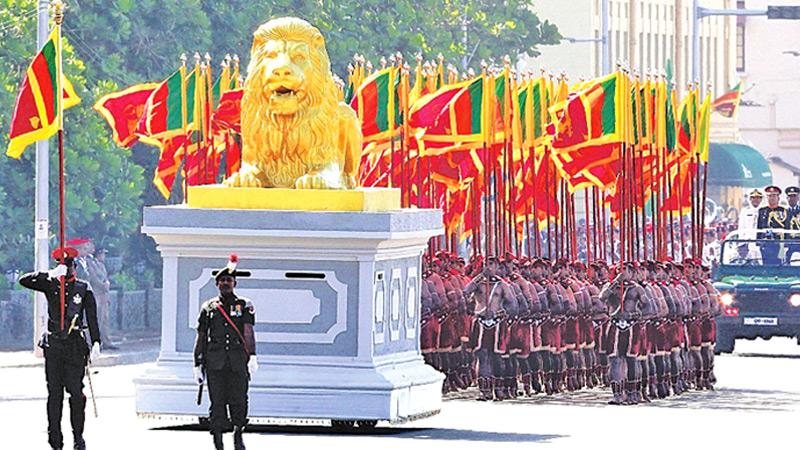
Sri Lanka has now reached its 72nd year of independence. While most in the present generation have not actually witnessed the significant moment when our National Flag was hoisted on that eventful eve of our first Independence Day, stories about the colonial era or the British occupation are still being told by grandparents at dinner table.
Certainly, the euphoria of that time in 1948 promised much hope for a prosperous united nation. Yet, how many of us can truthfully declare that after 72 years that dream has been realised. In economic and developmental terms, we certainly have much to be pleased about. Thanks to the industry and ingenuity of our farmers, we have become self-sufficient in most staple food production, and thanks to the vibrant private sector, social goods and services have been delivered to nearly every corner of the country.
There are many success stories too for example, from women’s empowerment to health, we have made great strides after independence, though, of course, much more remains to be done. While we have managed to cut poverty rates and created opportunity and growth, it has come at a cost. The gap between the rich and the poor yawns wider than ever, and inequality, poverty, and hopelessness still exist. We must redouble our efforts to include everyone in the fruits of freedom and ensure that no one is left behind.
One of the fields we failed in was our flawed education sector. It is the reason behind our lack of forward-looking community leaders? Like many emerging commonwealth nations, Sri Lanka has adopted a rote-learning approach in education, which has remained practically unchanged since formal education was first practised. Is it surprising, then, that we cannot turn out citizens and leaders who demonstrate clear vision and commitment?
Education sector
Sri Lanka’s formal education system is just one point of the triangle. The others are our religious and cultural values. Together they form an integrated, self-supporting unit, forming our identities and directing our actions as Sri Lankans. The education system is not designed to develop leaders, original thinkers, learners, or inventors.
The system creates citizens who have memorized a ‘solution’ for each ‘problem’. With the changing global scenario, we have failed to change our colonial education system. The young people who come out of schools or universities were unable to respond to new problems. They did not possess adequate knowledge and practical experience of the skills needed to face the world. They only had book knowledge.
This country’s leaders are also the products of the same society. These leaders were taught to seek a ready-made solution for pre-defined problems. When they encounter problems, they look for solutions that worked in the past, or worked elsewhere. But today is not yesterday. They think that ‘if it worked then, it would work now’. By educating the children of today to be flexible, inquiring and creative - we will be guaranteeing the citizens of tomorrow who will be the caretakers of our social and cultural identity. Is it too much to dream of a Sri Lanka that is an academic centre of excellence? It only takes one generation.
Today the best schools in Sri Lanka are judged by their GCE (O/L and A/L) performance, which forces them to follow rote / examination-oriented learning, whether they like it or not. All apparent attempts to improve some segments of the system are superficial and will prove futile unless there are fundamental changes in the education system at national level.
Social values
What is happening to our social values, those moral thoughts and behaviour we used to hold dear, like decency, civility, honesty and respect, as well as caring, empathy, and tolerance?
Five decades ago, our country was a beacon of idealism and progressive values to people the world over. Its foundation credos were revered at home and emulated abroad. The children too were taught their significance. A sense of being part of the ‘Sri Lankan’ enhanced our citizens. We were close to and bonded with our neighbours whether they were Tamils, Muslims or any another. Things have radically changed.
If we continue our descent into callousness, selfishness and hostility, we negatively impact and harm the quality of our lives. Words of rage and hate can easily be forerunners of violence.
Seventy two years after independence, there is little evidence of the freedom that we have been promised. The system has only been altered to the point of being tinkered, just to keep the curiosity of ordinary citizens alive who wait in vain for a genuine change. The insatiable greed of the elite to grab a bigger slice of the economic pie to maintain their privileged status is leaving the vast majority of the nation in a state of growing chaos - a kind of turmoil that inevitably engulfs everyone.
Sometimes it seems we are just surrounded by a war of words: Diversity, Unity, Patriotism, Pluralism, Ethnicity, and Multiculturalism. Words tap deep feelings, and can mean different things to different people. But the conflicts we face are about more than words.
The varied tensions that have come out, both racial and religious, show us that we have diverted from our path to oblivion. It is not where we should go as a country. These pressures are visible in many of our complex public issues and are evident in our daily life - whether in open conflict among groups, or in tensions and misconceptions simmering beneath the surface.
Caught in these real-life complexities and divisions, some people are even questioning our ability to live together.
But this is also a time of hope. We Sri Lankans can and must find ways to move toward a more perfect union in an age of diversity. Many community leaders, from every sector and racial background, believe this is a critical time to consider what we hold in common, what keeps us apart, and how we can work together to build a strong, better place. That is the spirit of true Independence.
